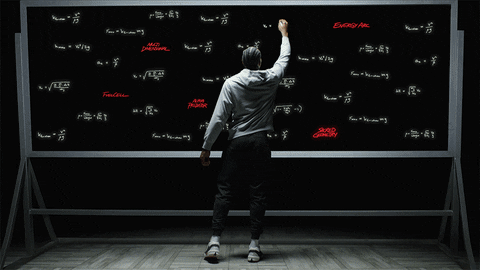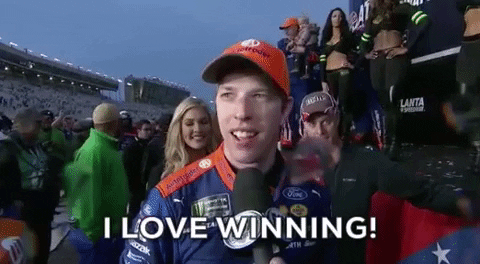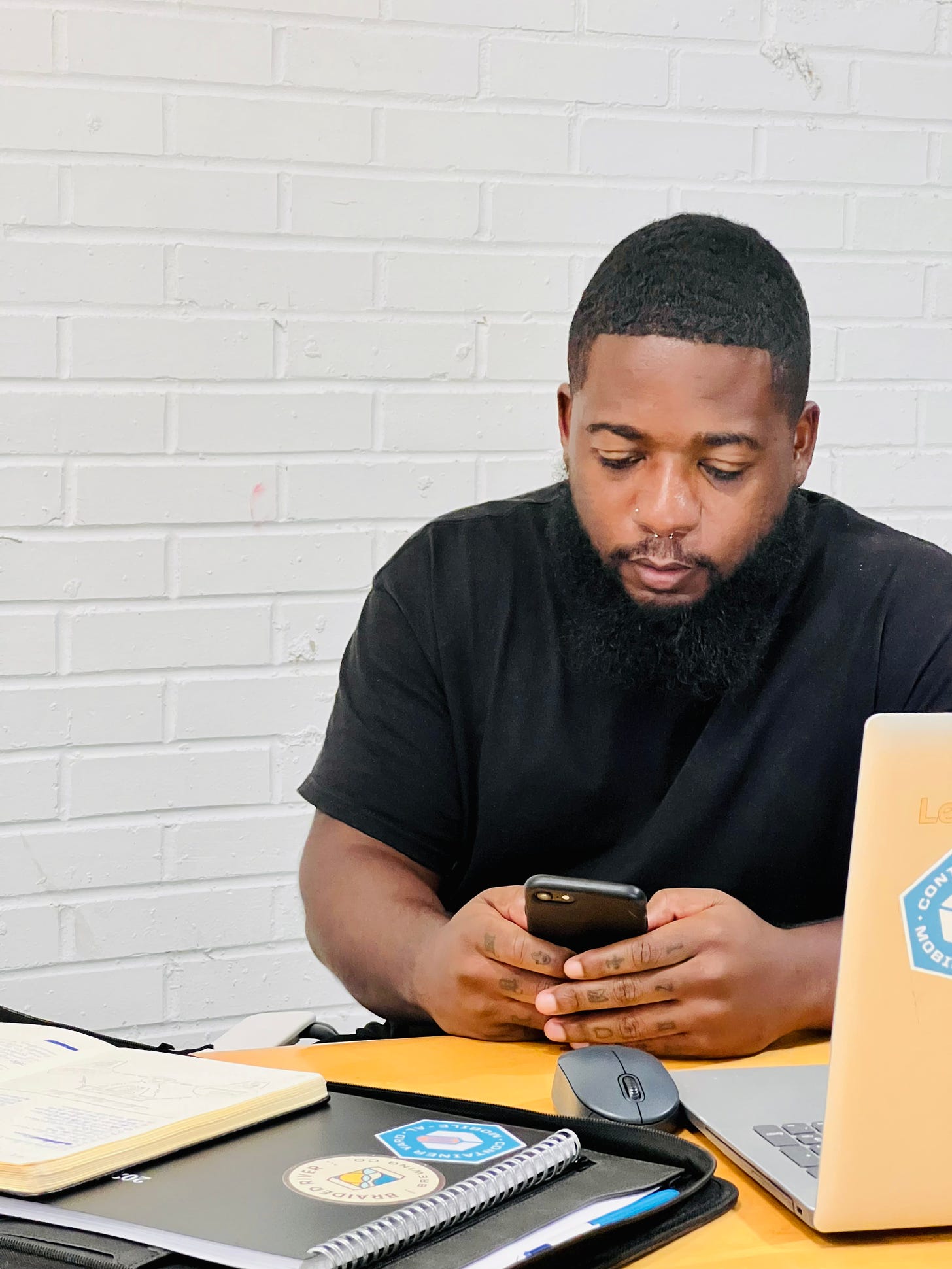This week I’m breaking down what the 2 habits are, how they affect our mindset, and how student-athletes can use them before, during, and after the game.
Connect with me on LinkedIn so we can keep the conversation going.
The 2 Big Habits Of Peak Performance
Before we dive into the habits, let’s have a quick peak performance refresher:
Peak Performance is backed by studies done in the neuroscience field and it’s defined as getting our biology to work for us rather than against us. This is primarily done by initiating an optimal state of consciousness called "Flow" where we feel our best and perform our best. You may know this state as "runner's high", "being unconscious", or "being in the zone".
Flow refers to moments of rapt attention and total absorption when we get so focused on the task at hand that everything else seems to disappear, action and awareness merge, our sense of self vanishes, time passes strangely, and performance just soars.
Check out the first two editions of this lifeletter if you want a full recap.
📌The Magic Formula To Peak Performance Every Student-Athlete Must Know ✨
Last week, I featured a quote from my mentor's book “The Art of Impossible”. But to fully grasp the severity of the habits, we have to unpack the impossible concept.
The Art of Impossible 🚀
Steven Kotler poetically opens his book with this statement:
This is a book about what it takes to do the impossible. In a real sense, it’s a practical playbook for impractical people. It’s designed specifically for those of us with completely irrational standards for our own performance and totally unreasonable expectations for our lives.
Sounds familiar? 😉
He then goes on to define impossible as a kind of extreme innovation. But then he breaks it down into two subcategories.
Capital I Impossible - all the stuff that has never been done before and, most believe, will never be done. These are the feats that exceed both our capabilities and imagination. They lie beyond our wildest dreams in the most literal sense. Paradigm-shifting breakthroughs. Four-minute miles. Moonshots.
Lowercase i impossible - all the things that we believe are impossible for us. All the same rules apply, as this is still the stuff beyond our capabilities and our imagination, just on a different scale. They’re the feats that no one, including ourselves, at least for a while, ever imagined we’d be capable of accomplishing. Write a book. Start a business. Marry that girl.
Flow is the biological formula for impossible.
And when it comes to stalking capital I Impossible, lowercase i impossible, and playing the infinite game of life; there’s a quartet of skills that’s required: motivation, learning, creativity, and flow.
All 4 are needed to be a lifelong student-athlete and peak performer. But motivation is a pivotal skill pre-graduate student-athletes need to master while still competing. This will lay the foundation to develop the remaining skills.
Motivation 101 💪🏾
I used to despise being referred to as a motivational speaker in my 20s. One of my favorite quotes is from Jim Rohn, where he says: Motivation alone is not enough. If you have an idiot and you motivate him, now you have a motivated idiot.
But after studying neuroscience and learning the part motivation plays in peak performance, I now say: I’m not a motivational speaker, but I break down the science of motivation when I speak.
Psychologists use the term motivation as a catch-all phrase for 3 subsets of skills: drive, grit, and goals.
To understand the 2 habits better we have to unpack drive.
Drive happens because of powerful emotions and feelings that drive behaviors automatically.
Since impossible is always an arduous trek, elite-level performers never rely on a single source of fuel to sustain them along the way. And this is true for both physical fuel and psychological fuel.
As a student-athlete, we get the physical fuel part: sleep, exercise, hydration, and nutrition.
But equally crucial, if not more, is stacking psychological fuel sources. Stacking means to cultivate, amplify, and align. So elite performers make sure they cultivate and align drivers such as curiosity, passion, and purpose.
To make things even more manageable, scientists split our psychological drivers into two categories: extrinsic and intrinsic.
I’ll dive into the extrinsic ones in a later edition, but for now, we only need to focus on the intrinsic psychological drivers.
We already covered three of them. The other two are mastery and autonomy.
These 5 potent intrinic drivers; curiosity, passion, purpose, mastery, and autonomy; are neurobiologically designed to work together. And we see it play out perfectly with our 2 big habits.
Habit #1: The Habit of Inferiority 😞
Peak Performance is an unusual kind of game. It’s one that’s unwinnable, but you can definitely lose.
True peak performers play the game for life, so that’s technically why it’s unwinnable. But the way you can lose is far more severe.
The brilliant Harvard psychologist William James explained it like this:
The human individual lives usually far within his limits; he possesses powers of various sorts which he habitually fails to use. He energizes below his maximum, he behaves below his optimum. In elementary faculty, in coordination, in power of inhibition and control, in every conceivable way, his life is contracted like the field of vision of an hysteric subject—but with less excuse, for the poor hysteric is diseased, while in the rest of us, it is only an inveterate habit—the habit of inferiority to our full self—that is bad.
Evolution designed us all for optimal performance so this is how the system wants to work—and there are serious consequences for trying to buck the system.
Another way to look at the habit of inferiority is the disconnection from meaningful values and the disconnection from meaningful work, which are both major causes of anxiety and depression.
Disconnection from meaningful values: lacking curiosity, passion, and purpose in your life.
Disconnection from meaningful work: being forced to do work (lack of autonomy) that is boring or overwhelming and does not advance core skills (lack of mastery).
Habit #2: The Habit of Ferocity 😤
The habit of ferocity is the ability to immediately and automatically rise to any challenge.
Whenever peak performers encounter life’s difficulties, they instinctively lean in. In fact, they lean in before they can even think about not leaning in. In the face of life’s obstacles, the best of the best don’t have to worry about staying the course.
So well arranged is their motivational stack and so well trained are their grit reflexes that rising to a challenge happens without their even noticing. Developing the habit of ferocity also lowers cognitive load. We burn a lot of calories being anxious about the task ahead. But once we can automatize our lean-in instinct, we not only save time, we save energy.
We don’t rise to the level of our expectations, we sink to the level of our training.
If you don’t develop the habit of ferocity — that is, automatize the motivation triad of drive, goals, and grit — sooner or later you’ll trip over your own fear. It’s basic biology.
W.I.N. With The 2 Big Habits🥇
W.I.N. is a framework I created after writing “Triggered 2 Triumph”. Although peak performance is an unwinnable game, I still want student-athletes to learn how to:
Create (W)ell-Being Via Flow
Dominate The (I)nfinite Game Of Life
Embrace That Riches Are In The (N)iches
Now let’s take each component of this framework, utilize the habit of inferiority and ferocity, and start getting some irrational, unreasonable results!
BEFORE: GET CURIOUS, STAY CURIOUS 🧐
The coolest part, to me, about the big 5 intrinsic motivators is that they’re biologically designed to work in a mechanical nature—one leading to the next.
Curiosity is our basic, innate interest in something. The neurochemical fuel of norepinephrine and dopamine turns the flicker of curiosity into the flame of passion. Next comes purpose, which requires connecting our individual passion to a cause much greater than ourselves. This adds oxytocin to the equation and an even bigger increase in core performance traits such as focus, productivity, and resilience, and our intrinsic fire burns that much hotter. Finally, once you have a purpose, you need to layer on autonomy (the freedom to pursue the purpose) and mastery (the desire to continually improve the skills needed to pursue that purpose).
This sequence can be used before your season, a practice, or a game. But curiosity is the trip wire to the process so stay curious to keep this spiral of peak performance principles active in your life.
DURING: MAKE IT MEANINGFUL 🥹
One of the worst jobs I’ve had was working overnight at Circle K—over 10 years ago at the age of 22. I worked alone and the neighborhood wasn’t the friendliest, so as soon as my shift started, I locked the doors and used a window.
I would break sweats during my shift running from the window to the cash register—plus grabbing things for customers and fixing/setting up things within the store.
The Habit of Inferiority could’ve been built in this environment. I very easily could’ve had a perspective that established this as work that wasn’t meaningful; that I was being forced to do work, boring or overwhelming, and did not advance my core skills.
But I remember telling myself, at 2 a.m., while doing a cigarette count, “If I can handle all of this for Circle K, I’d be able to do this and more for Chris one day.”
Find a way to make the work you’re doing now meaningful, where the future payoff is bigger than the present discomfort.
AFTER: FEROCIOUS FOLLOW-UP 🏃🏾♂️
Old-school sales/marketing studies state that it takes 7 impressions for someone to finally buy something. Some studies today have that number at 9. While others have it as high as 11.
This provides a difficult challenge that many don’t even consider. But think about it, most people are afraid to even ask for the sale—at all. Most salespeople quit after the first ask. To get to the point where you’re asking a 7th, 9th, or 11th time will take some ferocious follow-up. And to do it without coming across as pushy or annoying is another skill in itself.
In order to do this, you have to be so niched down in a specific industry and service that you could get to the 100th ask if you had to. Being a master at your craft and so familiar with the material that the follow-up feels like play vs work.
If you’re a pre-graduate student-athlete, you may not be at this point yet. It’ll take some years of experience to reach this level of mastery. But even if it’s something such as outreach for your dream job; you can follow up longer with one dream position in mind vs if you are considering a handful of different positions.
Last Words…
This is truly some of the information I needed to know when I was going through my life after sports transition, so I hope it’s been valuable for you.
These habits cover more reasons why it’s so crucial to get our biology to work for us rather than against us: because the failure to do this work carries serious psychological penalties.
And the way you break or prevent yourself from developing the habit of inferiority is by developing the habit of ferocity.
And to wrap this edition up, I’ll leave you with this quote.
Winners win and losers lose.
Be sure you don’t lose the peak performance game by being disconnected from meaningful values and work.
And remember, the best way to get a W.I.N. is to build the habit of ferocity!
Hope this added the fuel to ferociously launch your week! ♾️🔥🚀
See you next Monday! 😎
And when it comes to the infinite game of life…
Choose Flow.
Be Brilliant.
Ball Out.
Ready to invest in you?
Here are ways I can help:
Looking for the physical fuel to help implement the psychological fuel I’m providing you? Use my discount code, “CRC”, with The Ambrosia Collective to save on premium supplementation and make sure everything with nutrition is taken care of.
Ready to invest in your hair care, mental health, and self care overall? Click here to check out a brand that has EVERYTHING you need to serve these important areas.
Need help building a high-flow lifestyle or discovering your personal brand that’ll set you up for a positive transition? Click here to check out my coaching services and reach out so we can get the process started.
I spend my time speaking, coaching, writing, reading/researching, and thinking (and moving some major weight…as a powerlifter).
This newsletter is a completely reader-supported publication. If you love it and want to support it, the best way is to buy my book. Or if you want to donate to me directly using Cash App or your debit/credit card, that support will be immensely appreciated.









